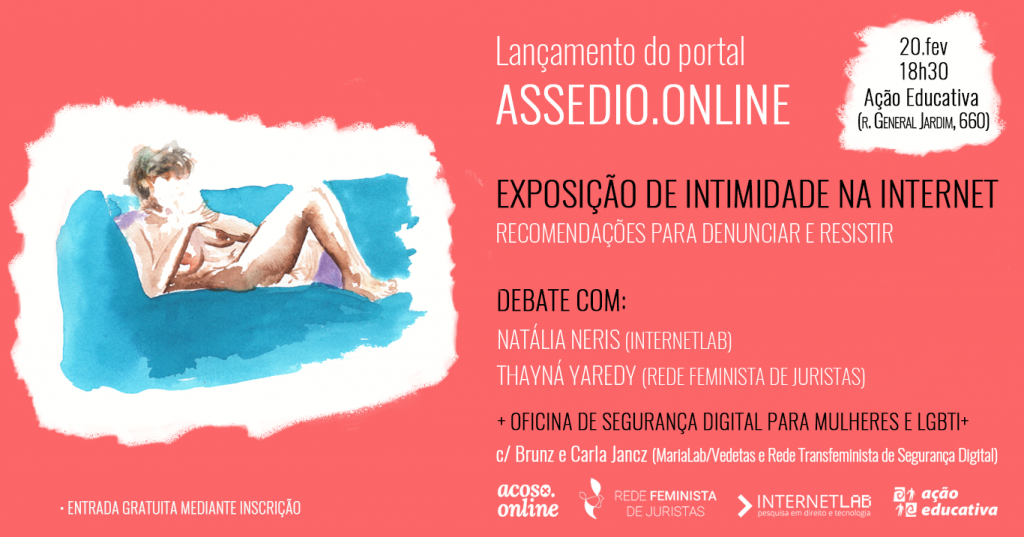
Assédio.online: new laws and website with guidance to victims of non-consensual intimate images
Between the years of 2015 and 2016, InternetLab’s Inequalities and Identities research team developed studies on the phenomenon of non-consensual intimate images, also known as revenge porn, and its dissemination online. This work became the book “The Body is the Code: legal strategies to face revenge porn in Brazil“, published digitally and under Creative Commons, and in a comparative analysis of laws, bills and juridical decisions in Brazil and other 26 countries (such as the US, South Africa, Australia, France, India, Japan, etc.).
At the time, researchers identified at least ten ongoing bills in Brazil that aimed to criminalize this practice. The first, PL 5555/2013, was the object of discussion of a public hearing and was altered, even including recommendations made by students of the USP Faculty of Law under the supervision of InternetLab researchers. In December 2016, the Center for Law, Internet, and Society of the USP Faculty of Law filed a brief with suggestions regarding the bill, proposing changes like the substitution of the term “consent” for “authorization” in the text that criminalizes the recording of images.
In 2018, the bill finally passed (on December 19th) and turned into Law 13.772/2018 (known as the Rose Leonel Law, who was one of the first victims of this practice in Brazil). The new law alters the Maria da Penha Law (n. 11.340/2006) to recognize the act as gender violence as well; and the Criminal Code, as it criminalizes the unauthorized recording of intimate content.
Also, in September 2018, the criminalization of the dissemination of images “without the victim’s consent” was also confirmed when PLS 618/2015 passed and is now Law 13.718/2018. The law also provisions an increase of the penalty in case the author of the dissemination of images had kept sexual relations with the victim or did the crime with the “purpose of revenge or humiliation”.
Assédio. online: how to denounce and resist
The bills’ passing added to a series of already existing devices that aim to fight this crime in Brazil. To expand the victims’ knowledge about the available resources, which are not only juridical, to follow-up on cases, Assedio.Online was launched in the country. It is a version adapted for the Brazilian context of the Acoso.Online project, Latin America’s first website dedicated to the guidance of victims of non-consensual pornography in the region.
Created in Chile, the website has expanded and through local partners, reached other 13 countries in the Americas: Argentina, Peru, Venezuela, Panama, Guatemala, El Salvador, Honduras, Mexico, Bolivia, Barbados, Colombia, and Paraguay. In Brazil’s case, InternetLab is the organization responsible for the localization of the project.
The site brings the discussions on non-consensual pornography to the surface, in addition to providing ways to fight it. There are guidelines on how to denounce the illegal content in digital platforms used to disseminate the content, and also in the legal system, keeping in mind the available laws on the topic within the local legislation. Besides, there is a series of recommendations on how to regain control over technology and safely exercise one’s sexuality, or even how to take in victims and begin a conversation with their community on the subject.
To mark the release of the website and to discuss the topic and ways to fight it, InternetLab will host an event on February 20th in São Paulo. The conversation about non-consensual intimate images will have the participation of Natália Neris, head of research of InternetLab’s Inequalities and Identities area, and Thayná Yaredy, lawyer of the Rede Feminista de Juristas (DeFEMde). The conversation will have the mediation of InternetLab’s director, Mariana Valente, and will be followed by a digital security workshop for women and LGBTI+ with Brunz and Carla Jancz (MariaLab/Vedetas and Rede Transfeminista de Segurança Digital).

Schedule
18h30 – Assedio.Online’s release + conversation with Natália Neris (InternetLab) and Thayná Yaredi (DeFEMde)
19h45 – Break
20h – Digital security workshop for women and LGBTI+ with Brunz and Carla Jancz(MariaLab/Vedetas and Rede Transfeminista de Segurança Digital)
When: 20.fev.2019 (wed), from 18h30 to 21h30
Where: Ação Educativa – Rua Gen. Jardim, 660 – Vila Buarque, São Paulo – SP
How much: Free